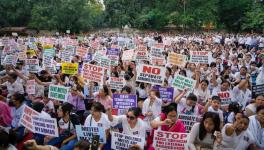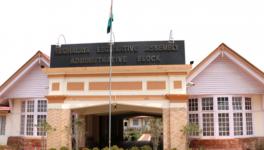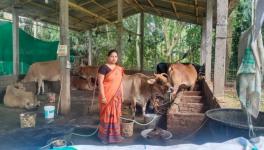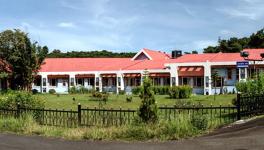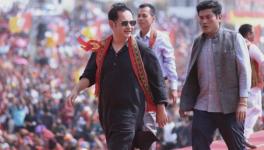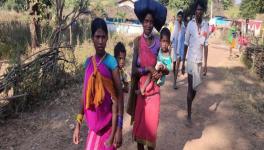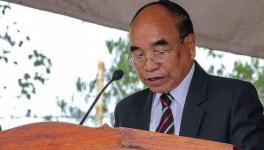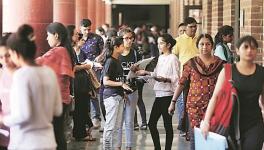Arunachal: Chakma and Hajong Tribes Protest to Get Rid of the 'Refugee' Tag
Protest against cancellation of Residential Proof Certificate (RPC) by the state government of Arunachal Pradesh. Image Courtesy: Twitter
New Delhi: Post July 2022, the Hajong and Chakma tribes of Arunachal Pradesh have been battling the disadvantages of not being permanent residents of the state. To people from these tribes across the country, landing a government job or getting admission to a Central University is impossible.
Rahul Chakma, a young lad in his early twenties, had to fight for permission from his boss to attend a protest in Jantar Mantar on January 8, 2023. The youth graduate from Dayam village in the Upper Subansiri district in Arunachal Pradesh works at a Hyundai showroom in Gurugram, earning around Rs 15,000 a month.
"I told my boss that it is not just a matter of some ordinary protest; it is a life and death situation for my community. It is for the future generations for whom survival will get difficult without our basic rights. Only then he allowed me to go."
The refugee label on the Chakma and Hajong tribes traces back to when Bangladesh was East Pakistan, and the then Indian government had settled around 20,000 refugees of these tribes in Arunachal Pradesh. These communities were displaced by the Kaptai dam and resorted to asylum in India. Later, the tribes were given Temporary Residential Certificates as well. The Supreme Court in 1996 and 2015 gave orders with a timeline to the Central and state Governments to grant them citizenship.
However, the communities have faced discrimination from the other indigenous tribes of the north-east states and have also been ostracised by the political parties.
"We are like a golden egg to the parties," said a youth from the Hajong community." The parties discriminate against us to lure the votes of the majority tribes. Whoever would talk ill about us is surely going to come into power," he added.
During his conversation with NewsClick, Rahul is reminded of his graduation days in Guwahati, where he studied B.com. He narrates, "There was always a hesitancy in accepting that I belong to the Chakma tribe. I could never add that; if I did or if the people I used to hang out with find about my tribe, I would be labelled as a refugee even though I was born in this very country. All my friends in my college days were only from my tribe."
Not just the indigenous people but the Chakma and Hajong residents allege direct discrimination from the state. There is not a single government college in their area, while conditions of the primary schools are dilapidating with just one teacher in many schools, teaching up till class 10th, allege the residents.
Arunachal Pradesh's government said on July 30, 2022, that a five-member committee, including two representatives from the AAPSU, would be formed to check the RPCs (Resident Proof Certificates). The group would be chaired by the secretary for food and civil supplies. The Arunachal Pradesh government stopped issuing new RPCs in Changlang district on July 31, 2022, and has since completely cancelled all RPCs.
This has resulted in revolts from the tribes. The disallowance does not just stop mere residential proof but obstructs these tribes from accessing education from government-aided universities and has even suppressed them economically. During the same time the government took this decision to give a Permanent Residence Certificate, Rahul had cleared his exams for the paramilitary forces. He wanted to join the Assam Rifles and serve the country. However, after clearing his written and physical exams, he failed to clear the document verification as he needed residential proof.
"I talk to my friends in the southern states of Karnataka and Tamil Nadu. All of us from our community come from financially marginalised backgrounds. We are solely dependent on agriculture. We wanted to uplift the condition of our families, but we are being stopped from doing so. My friends in the southern states work in factories and motor industries despite being highly qualified," iterated Rahul. The protests currently happened only at Jantar Mantar in Delhi, but in the coming months, if the government fails to provide residential proof to these tribes, the youth say they will protest in every state.
Around 50-60 people from Arunachal Pradesh had come to protest at Delhi's Jantar Mantar, and in total, some 500 people registered at the protest in the National Capital. Slogans of "Arunachal Government Down Down" could be seen. The leaders of APCSU (Arunachal Pradesh Chakma Students' Union stressed how the youth were being forced to drop out of schools and colleges right after the 10th grade since wherever they went, they had to face issues regarding their residential proof.
While Chakmas are Buddhists, Hajongs are Hindus by faith. About 65,000 Chakmas and Hajongs permanently reside in Arunachal Pradesh in Northeast India.
"The Chakmas and Hajongs are neither illegal people, foreigners, nor refugees but bonafide Indian Citizens and permanent residents of Arunachal Pradesh. The Hon'ble Gauhati High Court vide Judgement dated 19.03.2013 in PIL No. 52 of 2010 has held that the Bengal Eastern Frontier Regulation (BEFR), 1873, or ILP, shall not apply to the Chakmas and Hajongs because they were permanently settled in Arunachal Pradesh by the competent authority. Hence, the decision to withdraw the residential proof certificate (RPC) and to issue a 'Temporary Settlement Certificate' (TSC) to them is illegal and illogical. 90-95% of Chakmas and Hajongs are citizens of India by birth under section 3(1)(a) of the Citizenship Act of 1955," stated Drishya Muni Chakma, President of the APCSU.
The communities strongly disagree with accepting the tag of a Temporary resident.
"We were born here. The ones who migrated from East Pakistan, almost all of them are dead now. Why are we labelled as refugees? We were born here, studied here, and want to serve the country. We have lived with this label for almost 60 years now. And now, if we settle for a temporary resident certificate, the refugee tag on us will stay for the next 60 years," says Priyanka, another youth from the Chakma community who has been living in Delhi for a couple of years now.
Rahul could not study post his graduation since he was not financially strong. Gave an exam for paramilitary forces and was also selected, but he was denied because of the residential proof. Hundreds like him were denied government jobs and admission to Central Universities.
"After the transportation cost, house rent, and daily expenses, I hardly manage to save anything to send back home. I do not see an escape," says Rahul.
Youth like Rahul have accepted their fate. They feel that the government will not do anything for them now, and they will have to survive somehow. However, their battle for a Permanent Resident Certificate is for the younger generations. People in the community are under a lot of rage and want to amplify the protests in the near future. As the northeast state moves closer towards the Assembly elections this year, so does the battle of the Chakma and Hajong tribes to get their basic human rights of being citizens.
Get the latest reports & analysis with people's perspective on Protests, movements & deep analytical videos, discussions of the current affairs in your Telegram app. Subscribe to NewsClick's Telegram channel & get Real-Time updates on stories, as they get published on our website.









